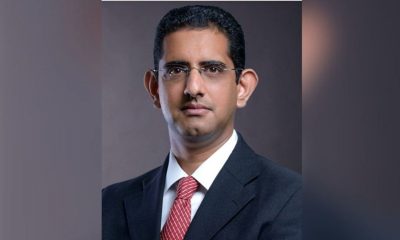Politics
Fair Share Contribution: Mauritius Revises Rs12 Million+ Tax Measures for High Earners

Mauritius’s government has announced changes to the Fair Share Contribution, a tax aimed at high-income individuals and large companies. The move is intended to support the country’s economic growth, according to the Council of Ministers. However, critics say the decision marks a reversal and has sparked debate.
Original Tax Plan in the Budget
The Fair Share Contribution targets taxpayers earning over Rs 12 million annually, including dividends from domestic companies. Those affected will pay 15% on their taxable income after adding dividends received during the year.
This tax will be collected through the Pay As You Earn (PAYE) system starting July 1, 2025, and will last for three years until June 30, 2028.
For example, someone earning Rs 20 million a year—Rs 7 million in salary and Rs 13 million in dividends—will owe Rs 1.2 million in this contribution.
The measure also applies to companies with a taxable income exceeding Rs 24 million. These firms will pay:
- 5% of their taxable income if they are taxed at the standard rate of 15%
- 5% on income from banks, including transactions with non-residents and global business companies
- 2% on companies benefiting from a reduced tax rate of 3%
This corporate contribution will be paid quarterly, similar to the Advance Payment System, under the Value Added Tax Act.
Recent Adjustments
During the latest Cabinet meeting, the government decided to modify the tax to better attract foreign investment and talent.
Officially, the Fair Share Contribution was “adjusted and clarified,” but detailed changes have not yet been announced. Officials say more information will be available in the upcoming Finance Bill.
Reactions to the Change
Many see the revisions positively. Roomesh Ramchurn, a partner at Forvis Mazars, called the move “a good sign.”
He explained that the initial plan could have discouraged investors and made the country less attractive, especially compared to Dubai, where income and dividends are not taxed.
Ramchurn also pointed out that entrepreneurs often split earnings between salaries and dividends.
Since corporate profits are already taxed, taxing dividends again could have led to double taxation, which might have discouraged business growth.
He suggested excluding dividends and interest from the contribution and focusing only on salaries.
A more balanced approach, he says, would be to add a 5% surcharge on incomes over Rs 12 million, raising the total tax rate to 25% for high earners.
Financial analyst Imrith Ramtohul also sees a potential reduction in the contribution as positive.
He noted that the government’s summaryis indicating the tax may be lowered, which would benefit companies by reducing their tax burden and encouraging investment.
However, Ramtohul warned that such changes could impact government revenue projections, requiring adjustments to the budget.
For high-income individuals, a reduction would ease the tax load, making the system more balanced between economic attractiveness and fairness.
Controversy Remains
Despite the optimism, the measure remained highly debated, with some critics opposing the revisions.
Nalini Burn, observer: “Lobbies of the powerful influenced the decision”
Burn pointed out that most of the government’s revenue comes from consumption taxes, including VAT and excise duties.
This means consumers bear the main financial burden. She noted that for over twenty years, Mauritius has operated as a low-tax country, benefiting businesses and high-income earners.
She questioned whether it’s fair that wealthy individuals receive tax advantages, asking, “Why is this fair?”
Burn also criticized the temporary nature of the Fair Share Contribution, which was announced in the Budget to last three years.
Meanwhile, social measures like pension increases are permanent. She highlights an imbalance, pointing out that only a small portion of the population benefits from income support: just 0.7% earn less than Rs 10,000, and 13.3% of households earn under Rs 20,000.
“This targeting of the most vulnerable is minimal, while exemptions for the wealthy are being strengthened,” she says. She urged to wait for the government’s detailed plans.
Burn believed the revision of the Fair Share Contribution isn’t just about economic strategy.
She suggested it’s driven by pressure from powerful lobbies, especially in the financial sector, which contributes significantly to the country’s GDP.
She noted that the Governor of the Bank of Mauritius comes from this elite group—wealthy individuals and those managing wealth locally.
Burn compared this influence to what happened with the introduction of Corporate Social Responsibility (CSR).
She argued that the government’s retreat on the Fair Share Contribution contradicts its stated goal of shifting from a consumption-based economy to a productive one.
Instead, the focus remained on real estate investment rather than developing productive sectors. She warns this sends the wrong signals.
Jane Ragoo, union leader: “The trust has been broken”
Ragoo criticized what she defined as double standards and favoritism toward big capital interests.
She claimed the contribution will likely be reduced, finding it “revolting.”
She questioned why the government responded favorably to the wealthy’s demands without mobilization, yet has previously praised taxing the rich.
“Now, they’re reversing that stance. Why the silence?” she asked.
She further accuseed the government of double standards, especially as trade unions continue to fight for pension reform without dialogue.
“We sent representatives to Parliament to improve workers’ conditions. Once again, big capital benefits,” she said, accusing the government of being ultra-liberal.
For Ragoo, this change damages more than just fiscal policy—it erodes public trust.
“We must remain vigilant. The trust is broken, and that’s very sad for the population,” she concludes.
Ram Seegobin, Lalit member: “Without this measure, the Budget is worthless”
Seegobin considered the high-income tax as one of the few positive aspects of the Budget. “The rest is negative and offers no real development or job creation.
It’s just cutting expenses and increasing revenue elsewhere. If this measure is scrapped, there will be nothing positive left in the Budget,” he lamented.
Lindsey Collen, also from Lalit: “We need to raise taxes on the wealthy”
Collen questioned whether the government will increase or decrease this contribution. She advocates for higher taxes on the wealthy and corporations.
“In the past, it wasn’t taboo. In the United States, top tax rates for the rich ranged from 70% to 94% at times,” she noted.
Mauritius’s financial sector calls for more clarity and fairness
After mixed reactions to the introduction of the Fair Share Contribution in the 2025 Budget, the government has announced plans to make adjustments.
Officials now aim to clarify the rules to keep the country’s financial hub attractive and reassure investors.
The government appears to be shifting its stance on the Fair Share Contribution, a tax introduced in the 2025-2026 Budget.
The move follows protests from the private sector and investors. On July 11, the Cabinet confirmed that changes are underway to balance fiscal fairness with maintaining Mauritius’s competitiveness.
Originally, the contribution was meant to distribute the tax burden more evenly, targeting high earners and certain companies.
However, concerns arose about its impact on foreign direct investment (FDI) and Mauritius’s reputation as a stable financial center.
FDI flows have already declined from Rs 37.01 billion in 2023 to an estimated Rs 32.99 billion in 2024, according to the Bank of Mauritius.
Consultants and financial sector players have voiced reservations.
They worry that taxing dividends and increasing pressure on the wealthy could harm the growth of wealth management services, a key sector for the country.
Fazeel Soyfoo, an international tax partner at Andersen, said the lack of clarity about the government’s intentions creates uncertainty, especially for foreign investors and entrepreneurs.
“The treatment of dividends remains unclear, and not distinguishing between citizens and non-citizens doesn’t help attract talent or wealthy individuals from abroad,” he said.
In this context, the government’s plan to revise the Fair Share Contribution is seen as a way to adjust course.
Ryan Allas, CEO of Rogers Capital’s tax division, explained that clarifying rules, introducing a moratorium, and addressing accrued rights aim to better protect market players, especially in real estate.
“I hope dividends exempted from tax will be excluded from this additional levy,” he said. “This change shows the government is listening.”
He emphasized that clarity, stability, and fairness are crucial to restoring investor confidence. Soyfoo added that some conditions, like the three-year reference period, might also be revised.
He believes that even taxing high incomes is acceptable if the system is perceived as fair and predictable.
The government seems to be seeking a middle ground: meeting budget needs without harming the country’s economic competitiveness.
While details of the legislative changes are still awaited, economic players remain cautious but attentive to how the regulatory framework will evolve.
Source: Defi Media












Ian Jones
21/07/2025 at 19:22
I must say I am put off by applying for a retirement visa in Mauritius because of FSC since if I sell property outside of Mauritius of over approximately GBP 195,840 (MUR 12m) and then want to bring that into Mauritius to purchase property in Mauritius I must pay 15% on MUR 12m and that’s not taking into account that trigger based on all income over MUR 12m eg pension income, capital gains on equities and sale of property. To me Dubai sounds a much better proposition and I thing FSC is going to have a negative impact one somebody like myself as I understand it’s triggered from MUR 0 and not just anything over MUR 12m and as I understand it will be payable on top of the 20% chargeable on pension and dividend income.